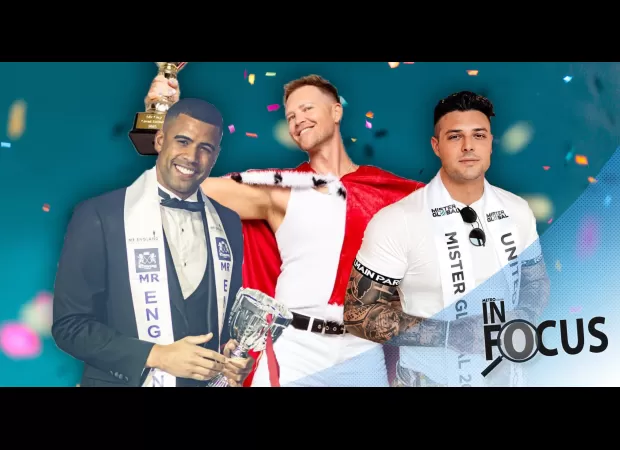Male pageants are highly competitive and intense, creating an atmosphere more extreme than Big Brother.
Competitions like this can help create positive change, countering the negative effects of today's male environment.

Male pageantry is big business across the globe, and it was an advert for the Mr Gay UK competition with the promise of a £1,000 prize that caught the eye of Stuart Hatton in 2013. With rainwater seeping through his bathroom roof, he thought: ‘Why not’. Little did he know that this decision would change his life forever; after coming first out of more than 250 men at the event, he decided to use his new voice for good.
As an underwear model and dancer, Stuart was used to putting himself on show and he was delighted to win, but as he stood before the judges in his rainbow underpants, his bare feet bleeding from the broken glass on the nightclub floor, he thought: ‘I’m going to change this whole thing’. He realised he could use his platform to raise awareness of work within the LGBTQ+ community, and even enough to calm the harmful waves of toxic masculinity that are flooding our online and public spaces.
The little-brother to competitions like Miss World and Miss Universe, male pageantry is similar in that competitors enter various rounds, including the likes of swimsuit and national dress rounds, congeniality competitions, talent contests and are expected to show that they have taken part in charity work and community projects. Arnold Schwarzenegger is by far the most famous male pageant competitor, with his 1967 success at the Mr Universe competition leading on to Hollywood stardom and a political career.
Liam Ulla, the current Mr England, didn’t have to walk onstage in his speedos when he entered Mr Dorset in 2019 after being scouted at a business networking event. For Liam, a 30-year-old model and business owner, the competition has allowed him to show that he need not be defined by the mistakes of the past, and that they have in fact allowed him to grow. As a professional kitesurfer, he was rated on his physical ability at the competition, undertaking a fitness test and using his kite-surfing skills to wow the judges. His charity efforts also played an important part, as he runs not-for-profit eco foundation, Coacoara, which aims to remove single use plastics from homes and commercial spaces.
Lewis Ellis, Mr Manchester, entered the competition in 2020 because he tries to say ‘yes’ to everything. He found the whole process hilarious, and a chance to ‘enhance’ his presence in Manchester. Though he initially found the competitions ‘dead cringe’, his can-do attitude landed him a stint on The Apprentice and Channel 4’s The Great Sex Experiment. His participation in the pageantry circuit opened his eyes to the differing experiences of men from around the world. Lewis, who is the first mixed-race Mr England, believes it’s really important in the times of Black Lives Matter to show that someone who is perhaps not from the best of backgrounds, or someone who isn’t white and privileged, can build himself up.
Male pageantry is certainly changing, and with its progressive stance and inclusive outlook, it could be a source of inspiration and hope for many. It can provide a really good antidote to the poisonous environment many men are living in today, by showing them that they can have a good name and a good career for themselves. It’s not all serious business either; the competitions can also be a lot of fun, allowing participants to learn about each other and the world.
Male pageantry is big business across the globe. When Stuart Hatton encountered a leaking bathroom roof in 2013, he saw an opportunity to get the £900 he needed for repairs in the form of the Mr Gay UK competition that had a £1,000 prize for the winner. He thought, ‘Why not?’ and entered the competition held in a Leeds nightclub.
Stuart, an underwear model and dancer, was used to putting himself on show, but as he stood before the judges in his rainbow underpants, his bare feet bleeding from the broken glass on the nightclub floor, he had a revelation: ‘I’m going to change this whole thing.’ He felt like the competition was a meat-market and he wanted to do something to change that. He used his platform to raise awareness of trans rights, non-binary rights and was invited to Parliament to discuss these issues.
Arnold Schwarzenegger is the most famous male pageant competitor, and his 1967 success at the Mr Universe competition led on to Hollywood stardom and a political career. Stuart was the last ever Mr Gay UK winner and went on to set up Mr Gay GB and recently announced the competition is going global. Liam Ulla, the current Mr England, was scouted at a business networking event and found that the competition allowed him to show he is not defined by his past mistakes. He also used his platform to run not-for-profit eco foundation, Coacoara.
Meanwhile, Lewis Ellis, the current Mr Manchester, entered the competition because he likes to say ‘yes’ to everything. He found it hilarious and a chance to ‘enhance’ his presence in Manchester. He was also entered into Mister Global 2021, which he admits felt like he’d lied on his CV. These competitions are not only fun, but they are providing a good antidote to the toxic masculinity that is flooding our online and public spaces, and they are showing people from different communities that they can build themselves up.
1 Views






